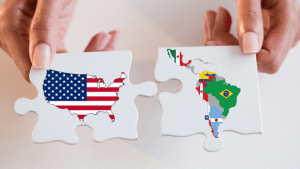
How Latin Americans see the United States: Dugout diplomacy
 Where yanquis are popular, where they are not and why
Where yanquis are popular, where they are not and why

READ the horror stories about the dozens of times the United States has sent troops into Latin America, and you might assume that the region is consumed with resentment against the imperial hegemon of el norte. In fact, Latin Americans are quite well-disposed towards the yanquis these days. The most recent international survey by Latinobarómetro, a Chilean polling firm, found that 65% of respondents had a good or very good opinion of the United States (see chart). And the countries that seem to have the most cause for grievance feel least aggrieved: the two most pro-American nations in the region are the Dominican Republic (which the United States occupied from 1916 to 1924 and invaded again in 1965) and Guatemala (whose president was toppled in a coup organised by the CIA in 1954).
Does that mean that the United States should send the Marines back as goodwill ambassadors? A closer look at the past 20 years of polling suggests not. There are more plausible explanations for variations in Latin Americans’ friendliness towards their northern neighbour. The region-wide view of the United States has oscillated considerably, from a low of 38% approval in 1996 to a high of 74% in 2009. Virtually all of these ups and downs seem to reflect just three factors: changes in foreign direct investment (FDI) from the United States and in GDP per person in Latin America, and the United States’ decision to go to war in Iraq and then to pull out. The more that American firms invest in Latin America, and the wealthier its inhabitants grow, the fonder respondents become of the gringos.
These averages conceal wide differences between countries. In 2015 just 44% of Bolivians liked the United States, whereas 83% of Dominicans did. The strongest predictor of these gaps is distance: South Americans tend to dislike Uncle Sam, whereas residents of Central America and the Caribbean feel more warmly. Apparently, the easier it is for Latinos to get to know the United States, the more they like it. The next most important factor, unsurprisingly, is remittances, which make up more than 15% of the GDP of El Salvador and Honduras, for example. There is no better advertisement for the United States than emigrants sending cash back home.
National politics also seem to affect the United States’ popularity. People governed by leftists, such as Venezuela’s Hugo Chávez or Bolivia’s Evo Morales, are more hostile than those led by conservatives such as Alberto Fujimori in Peru in the 1990s or Álvaro Uribe in Colombia in the early 2000s. Latin Americans also seem to hold the United States responsible for one of their region’s chief woes. Countries with high murder rates, which tend to accompany drug shipments flowing north, are less friendly to Americans than one would otherwise expect.
Even after taking all these variables into account, Dominicans’ extreme fondness for the United States remains unexplained. Perhaps the answer lies in a passion their island nation shares with its giant neighbour. Whereas soccer reigns supreme across most of South America, baseball is both the American national pastime and a veritable religion in the Dominican Republic, whose small population supplies a startling number of Major League baseball players. The path to a Latin American’s heart, it seems, is paved not with guns and bombs but with bats and balls.
